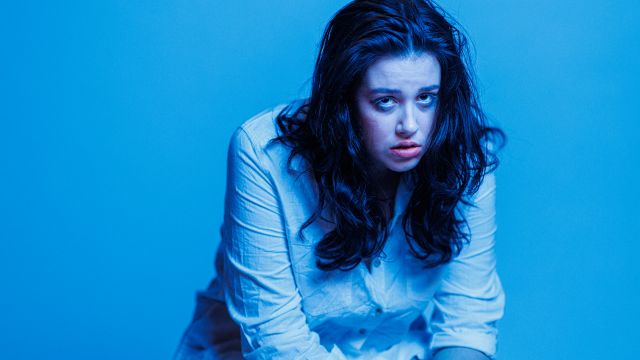The Angel with Blue Eyes
Kit (Bridget Morrison) has come out, to the horror and disgust of her fundamentalist Christian family. Her father’s response was to beat her up and throw her out of the family home. Her brother Peter (Ryan Tracey) not only did not defend her but wrote an open letter of disgust, denigrating her. Her other brother, loving Dan (Charlie Boscolo), remains loyal to her, separating him from his brother. And so, Kit’s family – albeit repressive and bigoted - has been rent asunder by Kit’s confession of her sexuality. Worse, Kit now lives with Billie (Sabina Gerardi), a woman who is hostile to Kit’s family, and has no interest in them, let alone the hurt Kit feels at their rejection.
But now, having taken this shattering decision, committing to Billie, Kit feels herself trapped in an abusive relationship. Billie only appears loving when she is dominant and Kit submissive and compliant. Otherwise, she can erupt, given to sudden rages in which she viciously hits, slaps and abuses Kit.
All this is witnessed by a figure invisible to the participants – Caelus-Veritas (Anne-Marie Biagioni) – a spirit figure, Roman god of the sky (usually male) and here played as a figure all in black (rather like a Goth?), who acts as Kit’s unheard conscience, and, I think, an outward representation of her inner states – of regret, guilt, the ache of separation and her helpless torn-in-two relationship with Billie. But Biagioni plays the character as a nightmarish grimacing, writhing figure (some curious decisions here by director Bronya Doyle), from a horror movie.
The problem with this earnest, serious text is a lack of focus. Apart from the awkward and possibly redundant addition to an otherwise naturalistic play of Caelus-Veritas, there is the question of trying to deal with, or mix, or ‘intercut’, two powerful themes or issues.
First, there is the consequences of ‘coming out’ to a homophobic family. The burden
of this strand should fall on Kit, but it falls more dramatically onto Peter, who, having loved his sister all his life, now deeply regrets his very public, cruel rejection. It’s a challenging rôle and Ryan Tracey makes the transition from knee-jerk prick to guilty, loving brother work and makes us feel for him. Charlie Boscolo’s Dan is something of a one-note rôle, but Boscolo has just the right stage persona here to sustain the character.
As Kit, however, Bridget Morrison, who has otherwise a sweet, touching quality, doesn’t convey as powerfully as the play needs the consequences of her decision. We don’t feel the pain of separation from her family, particularly Peter, nor the torn-in-two nature of her relationship with Billie. Perhaps the intention is that Caelus-Veritas with do that work for the character, but it doesn’t work.
The abusive relationship is the second strand, but that is, as it were, simply stated. Powerful as Sabina Gerardi’s performance is, other aspects of the relationship aren’t on stage. Why did Kit fall in love with Billie in the first place – and so strongly that she feels she can’t leave her? Too proud to admit a bad choice?
It's surely interesting that, in this Midsumma season, I have already seen two plays (the other is Daddy Developed a Pill) in which gay – or in these cases lesbians – are not depicted as – in the words of playwright Fitzpatrick-Lubowitz – ‘all pink, unicorns, rainbows and sexy pillow fights.’ On the contrary. There may be objections, but these playwrights are writing their truths.
Michael Brindley
Subscribe to our E-Newsletter, buy our latest print edition or find a Performing Arts book at Book Nook.

